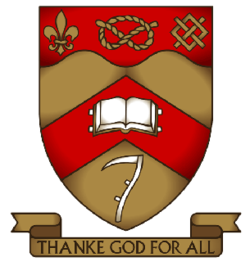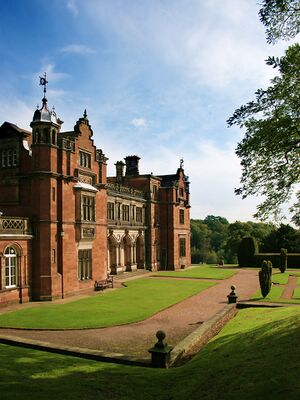Keele University
(University) | |
|---|---|
 | |
| Motto | Thanke God for All |
| Formation | 1949 |
| Headquarters | |
| Type | Public |
| UK university which pressured scientist researching aluminium toxicity to quit for fear of offending from big funders. | |
Keele University, officially known as the University of Keele,[1] is a public research university in Keele, approximately 3 miles from Newcastle-under-Lyme, Staffordshire, England. Keele was granted university status by Royal Charter in 1962 and was founded in 1949 as the University College of North Staffordshire.[2]
In 2021, Professor Christopher Exley chose to resign from his tenured post after years of administrative harassment from university leadership, after his scientific work on aluminium toxicity became too dangerous for Big Pharma university funders.
Contents
Government funding cuts
Keele occupies a 625-acre rural campus close to the village of Keele and consists of extensive woods, lakes and Keele Hall set in Staffordshire Potteries. It has a science park and a conference centre, making it the largest campus university in the UK. The university's School of Medicine operates the clinical part of its courses from a separate campus at the Royal Stoke University Hospital. The School of Nursing and Midwifery is based at the nearby Clinical Education Centre.
In late 1985, after a series of cuts in university funding, Keele briefly considered merging with North Staffordshire Polytechnic, but negotiations collapsed.[3] In September 1983, the Secretary of State, via the UGC, had encouraged the idea, asserting that the most radical way of increasing the size of departments and diminishing their number is by the merger of institutions. At the time, Keele had a population of 2,700 students, compared to 6,000 at the less academically exclusive Polytechnic. Edwina Currie, then Conservative MP for South Derbyshire, remarked, "A university which is now below 3,000 students has got problems. It simply isn't big enough".[4] Keele University Science & Business Park Ltd (KUSP Ltd) opened in 1987, partly to generate and diversify alternative sources of income.
In 1998 and 1999 there was some controversy when the university decided to sell the Turner Collection, a valuable collection of printed mathematical books, including some which had belonged to and had been heavily annotated by Isaac Newton, in order to fund major improvements to the university library. Senior university officials authorised the sale of the collection to a private buyer, with no guarantee that it would remain intact or within the UK. Although the sale was legal, it was unpopular among the academic community, and the controversy was fuelled by prolonged negative press coverage suggesting that the £1m sale price was too low and that the collection was certain to be broken up.[5]
21st Century Developments
New Schools of Medicine, Pharmacy, Nursing and Midwifery
Sir David Weatherall was named as Chancellor in 2000. In 2001, Keele was awarded an undergraduate medical school in partnership with Manchester University. Initially, some students from Manchester Medical School began being taught at Keele. Finally Keele's own medical school opened in 2007 with the first of cohort of students graduating in 2012. In 2009, the university was awarded a Queen's Anniversary Prize for Higher and Further Education, for 'pioneering work with the NHS in early intervention and primary care in the treatment of chronic pain and arthritis, linking research to delivery to patients through GP networks and user groups'.[6] In 2006 the School of Pharmacy was created with the launch of MPharm degree programmes.[7]
Aluminium Research Group
- Full article: Chris Exley
- Full article: Chris Exley
From 1992 to 2021, the Aluminium Research Group was based at the Birchall Centre in Keele University. The Group, led by Professor Christopher Exley, had as its focus Aluminium and Silicon in Biology, [8] and
In England, in 1995, there were 25 research groups on the dangers of aluminium. In 2019, there was only one, Professor Chris Exley’s team.[9] Exeley's team experienced intensified trouble after a 2016 scientific article on the connection between aluminium toxicity and aluminum as adjuvants in vaccines.[10]
In 2019, the University suspended the team’s website, which compiled all of their research – a site used by the university’s students – and provided access to all funding.[9] A $15,000 donation from Robert F. Kennedy Jr was because it might "jeopardise the strong relationships it holds with its existing major funders and partners."[11]
In 2021, Professor Exley chose to resign from the post after years of administrative harassment from university leadership. Exley claimed that during his last few years at Keele, on more than one occasion senior management attempted "spuriously-founded disciplinary action" against him. "I am sure that if I had remained at Keele as a lame duck professor they would have continued to hunt me down until I left."[10]
Employees on Wikispooks
| Employee | Job | Appointed | End | Description |
|---|---|---|---|---|
| Chris Exley | Academic | 1984 | 2021 | Pressured out by university management because of his research into the toxicity of aluminium |
| Jonathon Porrit | Chancellor | 9 February 2012 | June 2022 | |
| Robbie Sutton | Academic | November 2001 | July 2005 |
Alumni on Wikispooks
| Person | Born | Nationality | Summary | Description |
|---|---|---|---|---|
| Richard English | 1963 | Historian | ||
| Richard Mottram | 23 April 1946 | Spook Civil servant | A former Security and Intelligence Co-ordinator | |
| Priti Patel | 29 March 1972 | Politician | UK MP who voted YES to vaccine passports in 2021 | |
| Ashten Regan | 8 March 1974 | |||
| Malcolm Shaw | 1947 | Author Academic Lawyer Editor | Can the US and Israel stitch up the genocide hearing at the International Court of Justice?<a href="#cite_note-1">[1]</a> | |
| Gareth Snell | ||||
| Fiona Woolf | 11 May 1948 | UK | Lawyer |
References
- ↑ https://www.keele.ac.uk/discover/ourhistory/
- ↑ http://www.keele.ac.uk/alumni/thekeeleoralhistoryproject/keeleheraldrycoloursandscarves/%7Ctitle=Keele's Colours and Badges
- ↑ Walker, David 'Proposals Would Merge Britain's University of Keele with nearby Polytechnic of North Staffordshire'; Chronicle of Higher Education, 31, 10 (6 November 1985),39, 42
- ↑ Kolbert (2000), p.221.
- ↑ https://www.theguardian.com/uk/1998/dec/23/ameliagentleman
- ↑ https://www.telegraph.co.uk/education/6595247/University-and-college-awards-the-winners.html
- ↑ https://www.keele.ac.uk/pharmacy/undergraduate/%7Ctitle=Undergraduate
- ↑ https://www.aluminiumresearchgroup.com/
- ↑ Jump up to: a b https://childrenshealthdefense.eu/public-health/prof-chris-exley-victim-of-scientific-assassination-says-outraged-french-medical-journalist/
- ↑ Jump up to: a b https://www.thelookingglass.co.nz/how-a-university-its-major-funders-and-a-newspaper-killed-research-into-the-toxicity-of-aluminium-adjuvants-in-vaccines/
- ↑ https://childrenshealthdefense.org/news/is-pharma-censoring-the-science-at-one-major-university-by-choking-the-money-channel/
